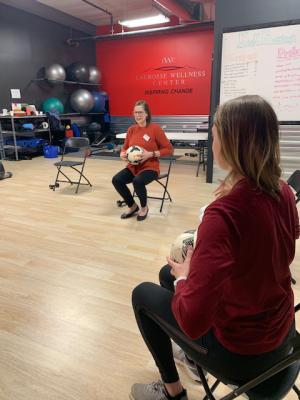Area residents who have been diagnosed with mid-stage dementia are receiving help from two Viterbo University nursing students undertaking a number of initiatives as part of an independent study course on gerontology. One of these projects is the Brain and Body Fitness class offered through the Aging and Disability Resource Center of La Crosse County.
Leading the current class cohort are Viterbo students Hillary Covington and Emma Lamke. The class, which meets twice a week at the La Crosse Wellness Center, consists of an hour of light strength, balance, cardiovascular, and language components followed by a half hour of social time. It is designed to help participants build and maintain their cognitive reserve as long as possible. The 10-week course began in April of this year, and the current group is the fourth class.
“It’s exciting to see the participants thriving,” said Kelsey Flock, the dementia care specialist with the Aging and Disability Resource Center. “Several caregivers told me they didn’t think their person would come, but now they can’t wait to go. Emma and Hillary have done an excellent job. They are independent, have implemented their unique ideas, and the participants really like them.”
Nursing majors Covington and Lamke are also minoring in gerontology. They are planning, leading, and evaluating the class as an independent study course with Viterbo nursing faculty member Cameron Kiersch. The experience has gone so well, Flock hopes Viterbo nursing students leading the class will become a permanent partnership.
“I thought this course would be an excellent way to round out my minor and undergraduate career,” Lamke said. “I have always enjoyed working with senior citizens, and this has given me the opportunity to do this in a way that makes a positive and hopefully lasting impact in the community.”
In preparation for the class, Lamke and Covington were trained as Dementia Friends and Dementia Champions this past summer. They will also share what they have learned with nursing students in a gerontology class taught by Kiersch and with the members of Western Technical College’s Human Services Club.
“We encourage students to go beyond nursing,” Kiersch said. “Many different professionals and people work with people with dementia. More than the training, it’s about increasing awareness. Hillary and Emma have demonstrated both top-notch service and extraordinary leadership. They are doing good work, and serving a population in our community who are often forgotten.”
In addition to facilitating the Brain and Body Fitness class, they are also undertaking other initiatives including the creation of a facilitator’s guide for group dementia exercise classes and a caregiver support video for the Aging and Disability Resource Center. Covington also developed content for emergency room “fidget” kits that the Aging and Disability Resource Center provided to local hospitals through a Dementia Crisis grant it received. These kits include community resources for caregivers and objects to keep a person with dementia distracted and allows them to release anxiety while they are in the emergency room or being admitted to the hospital. Covington developed communication tips for dealing with difficult behaviors and a content usage sheet to be included with the items.
“I wanted to do this because I think we make the biggest difference by being active in our communities,” Covington said. “I have learned so much from the participants and their caregivers, and the interactions we experience are every different from those in a hospital setting or long-term care facility. I decided to minor in gerontology because I felt like I had a duty to my future patients. People deserve great care across their entire lifespan and I wanted to make sure I will be able to provide that. Older adults bring wisdom and good to their communities. I have young children and I want them to see how different generations work together and I want them to be able to learn from the experiences of older adults.”
Both Lamke and Covington have found the independent study course to be very rewarding.
“Interacting with the participants and their caregivers through the Brain and Body Fitness class has been my favorite part of this independent study,” Lamke said. “The participants are connecting with one another, becoming friends, and seem to truly enjoy themselves. Best of all, many of the caregivers have told us they have noticed improvements in their loved ones.”
Photo Cutline: Hillary Covington, left, leads the Brain and Body Fitness class for people with dementia with the assistance of fellow Viterbo nursing student Kathryn Lichtie.
